incident.io raises $62M to build AI agents that resolve incidents with you

We’ve raised $62M to build AI agents that resolve incidents with you
Today’s a huge milestone for us at incident.io. We’ve raised $62M in Series B funding with over $96M in total, to pioneer a new era of AI-powered incident management. The industry’s reaching a turning point as AI transforms how engineering teams ship code at breakneck speed, while site reliability and incident response teams scramble to ensure it all runs smoothly.
That promise of a smarter future starkly contrasts with the frustrations we faced years ago. Back at Monzo, my co-founders Pete, Chris, and I saw the mess firsthand: clunky tools that were hard to use, inconsistent processes glued together by lots of humans, and barely a chance to learn from what went wrong. It sucked, and we knew there had to be a better way.
So we did something about it. In 2021, in a former London fire station, we started incident.io to build the incident management platform we wished we’d always had. Fast forward to now, and over 250,000 incidents later, we’ve become the default choice for elite engineering teams moving away from outdated tools.
Incident management’s big leap forward
A lot has changed since we raised our Series A in 2022. Back then, we were up against teams clinging to what they knew. Often, it was PagerDuty and some home-brewed mix of spreadsheets and ticketing systems. Engineering teams deserve tools that help them solve problems, not just stumble through them.
We set out to transform incident management. If you summed up our product in a word, it would be ‘intuitive’. We started by meeting engineers where they work, inside Slack, and honed a beautiful user experience that engineers would love using daily. That vision paid off, and we’ve welcomed some of the most forward-thinking engineering teams from companies like Netflix, Etsy, OpenAI, and Airbnb, amongst hundreds of others worldwide.
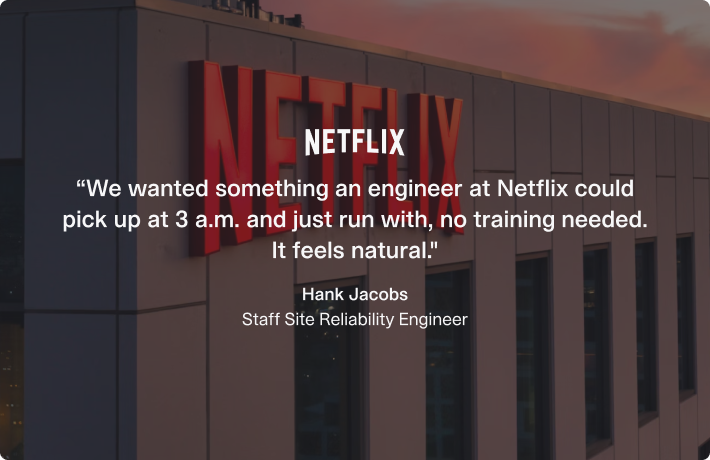
What separates us from the pack is that we’ve deliberately built an incredibly customer-centric company. We’re close to customers, listen to them, and relentlessly ship what makes their lives better — fast. That’s why we deliver product updates every week.
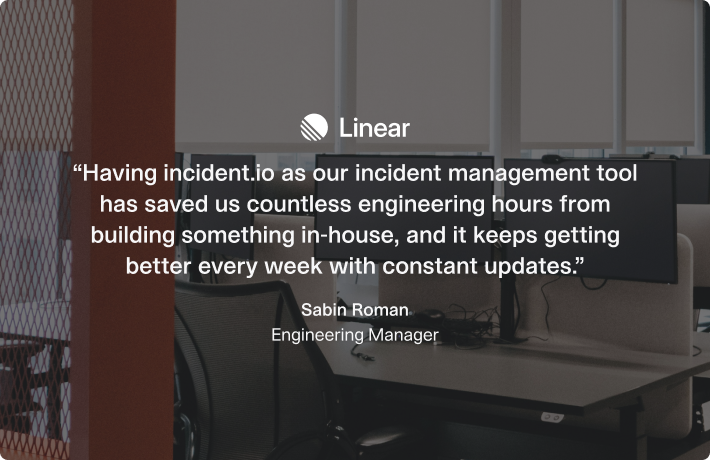
In March of 2024, we launched our third product, On-call. Customers told us they wanted a modern alternative to outdated paging tools like PagerDuty and Opsgenie, so we built it. A year after its debut, nearly two-thirds of our customers migrated away from legacy solutions. We expect that trend to accelerate with the recent news that Opsgenie is being shut down.
Using AI to tackle AI’s own chaos
Anthropic’s CEO predicts AI will write 90% or more of code soon. That future’s already here, whether we’re ready or not. Tools like Cursor and Claude are slashing the time from faint idea to production software, with large language models churning out features in minutes. When Andrej Karpathy coined “vibe coding,” it went viral, and the engineering teams we talk to daily feel the buzz. They’re massively accelerated and shipping code faster than ever. But here’s the catch: it’s not all fun when the vibe turns into debugging a production incident at 2 a.m., three nights in a row.
Software has always been a tangle of intricate systems, layer upon layer. AI cranks that complexity to 11. We’re staring at a world with vastly more software, but less context for any single person to grasp it all. That gap spells trouble: more incidents, trickier root causes, and outages that drag on longer. Teams tell us they’re thrilled by the speed, until they’re stuck unraveling the chaos it leaves behind. It’s our mission to stand with them in those moments, and we believe it’s critical for the future of software that we do.
Building AI incident responders to help resolve incidents faster
AI is already transforming how teams respond to and resolve incidents; engineers using incident.io save hundreds of hours across the incident management lifecycle, thanks to agents built to speed up time-to-response and cut operational overhead.
Traditionally, incidents demanded extensive manual effort, with tasks like real-time updates, note-taking, and post-incident summaries performed by humans. Today, our agents do these jobs for you, freeing engineers from countless ‘non-engineering’ tasks. For instance, Scribe automates call transcription, generates real-time summaries, and highlights key decisions, removing the need for a dedicated note-taker, which means engineers use their time to write code.
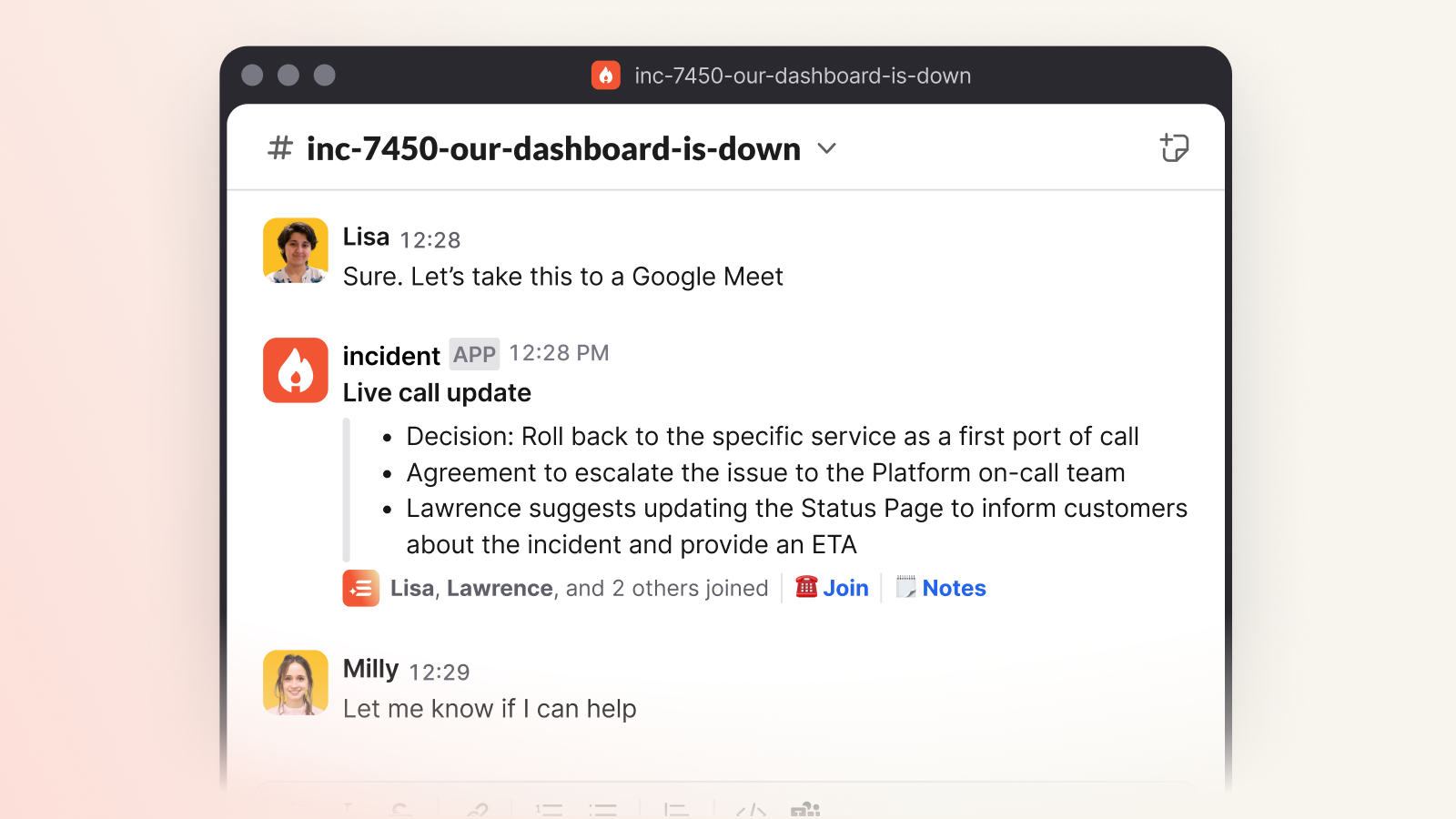
This year, we’re pushing our functionality to include AI agents to investigate incidents with you. We show you what’s wrong, why it’s wrong, and ensure engineers can get to the root cause an order of magnitude faster. Eventually, we’ll show you how to fix the issue and offer to fix it on your behalf. We’ll be right there with you during an incident, helping you drive the incident toward resolution just like your best and most experienced colleague would.
Imagine an on-call engineer is paged at 2am: instead of scrambling to identify the problem, incident.io quickly flags, “This is the bad change. You might want to revert that change”. We can instantly identify similar past incidents and review relevant code changes and diagnostic dashboards, putting vital context to your alert at your fingertips before you even open your laptop.
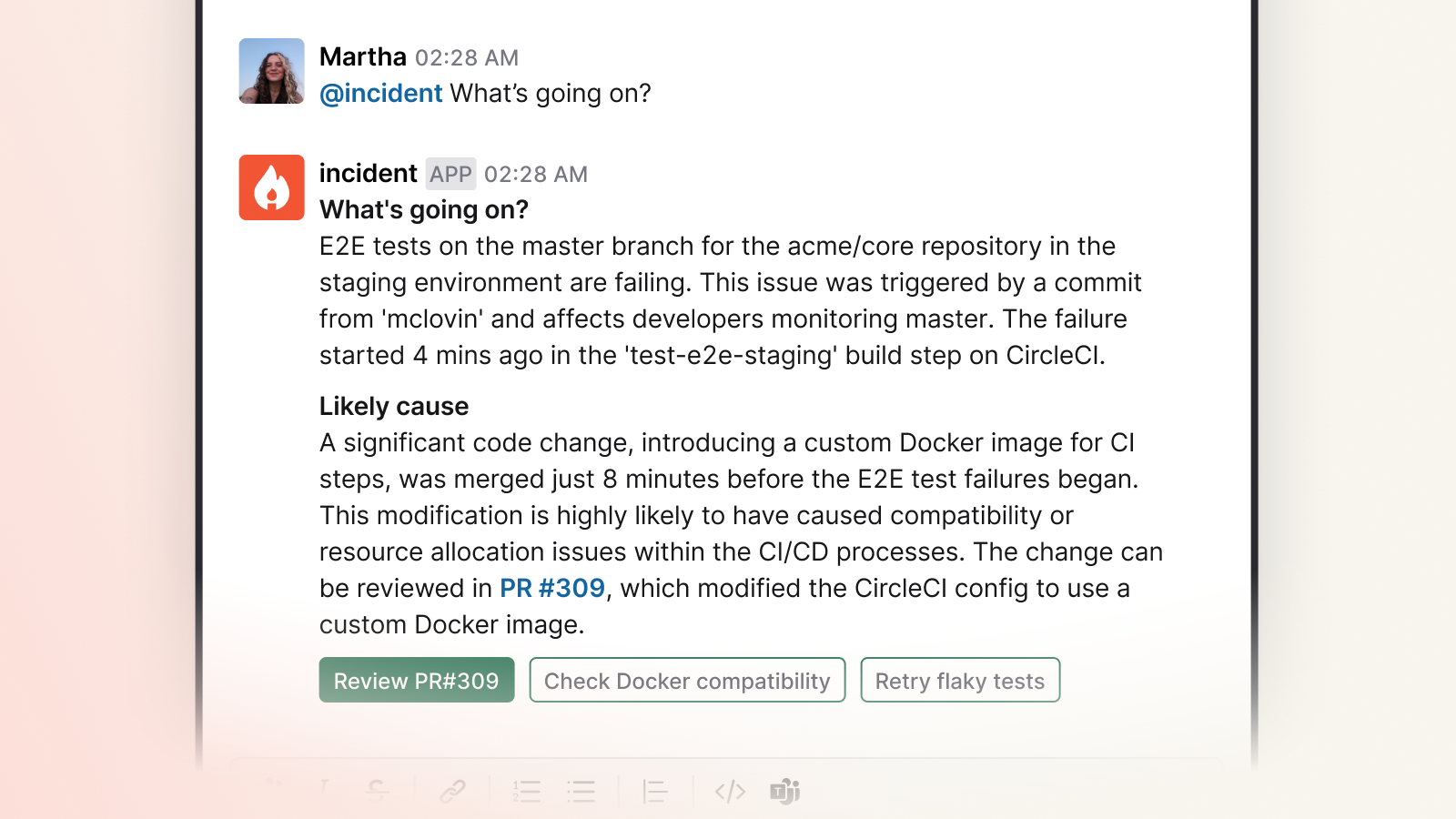
Our vision isn’t about replacing SREs or engineering teams; it's about giving them a powerful partner, amplifying their expertise, and freeing them to focus on the most critical aspects of incident response. So teams can significantly reduce downtime and get high-quality engineering time back.
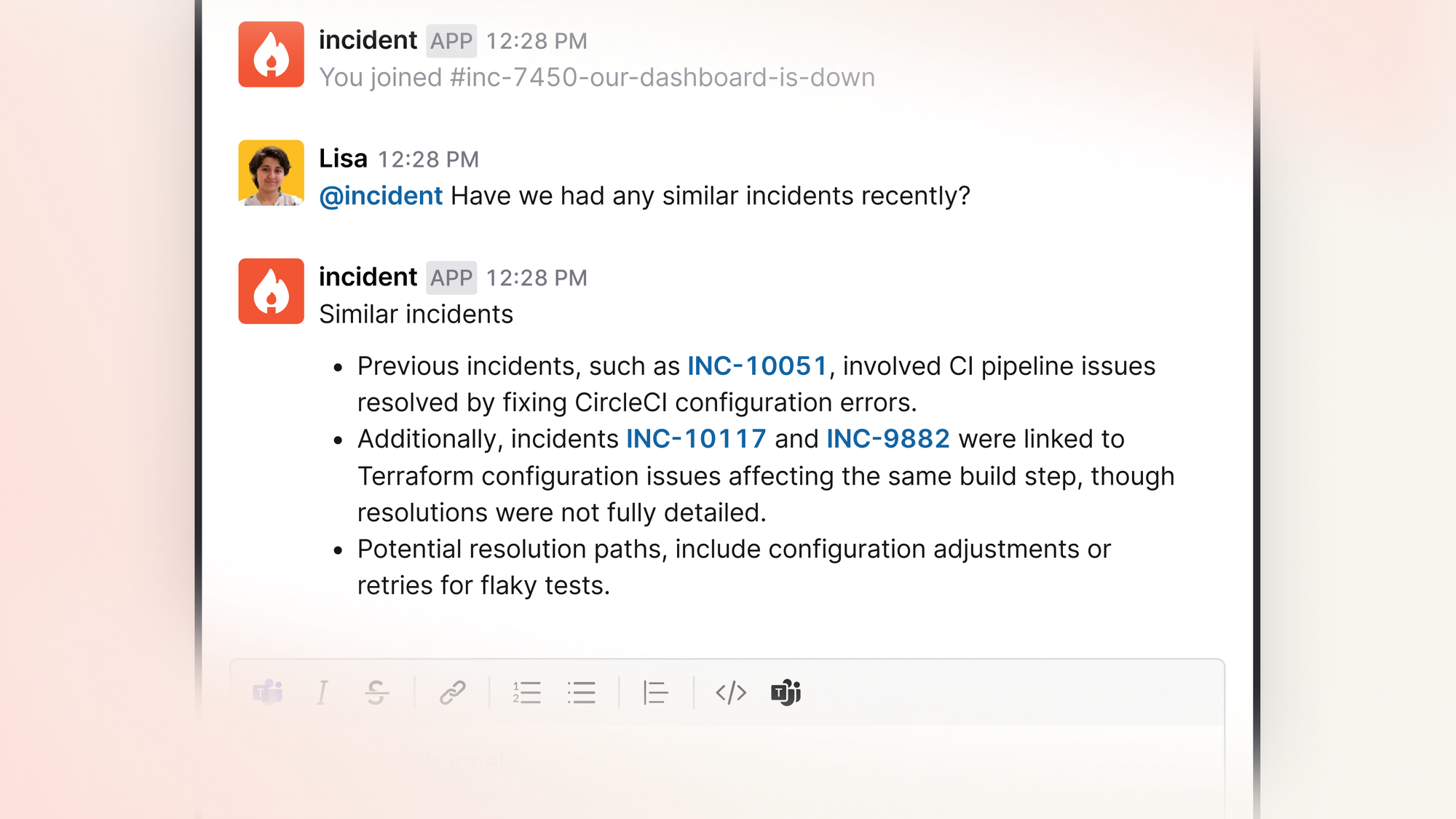
Here’s a behind-the-scenes look at our journey to build an AI incident responder, and a deep dive into our vision for the product.
$62M to build the future of incident management
This round, led by Insight Partners’ Thomas Krane, and with continued support from Index Ventures and Point Nine Capital, is a strong endorsement of our vision for agentic incident management. Having previously backed tech giants like Wiz and Databricks, we’re thrilled to welcome Insight Partners to the team.
With new funding, we’re accelerating investment. We’re hiring more engineers to speed up our AI vision and to craft products that users continue to love. Our global go-to-market teams are expanding in Sales, Customer Success, and Marketing to support our trajectory.
Build with us
So, with all that, there are two final things from me:
- Are you still using legacy tools or manual chaos, and do you know there has to be a better way? Well, there is. Grab a demo here to see more about what it is.
- Do you want to build the future of how the world responds when things go wrong? Us too. We're hiring in London and San Francisco for many different roles. Learn more here.
We’re just getting started. Let’s get building!

See related articles

Keeping it boring: the incident.io technology stack
This is the story of how [incident.io](http://incident.io) keeps its technology stack intentionally boring, scaling to thousands of customers with a lean platform team by relying on managed GCP services and a small set of well-chosen tools.
 Matthew Barrington
Matthew Barrington 
Secure access at the speed of incident response
Blog about combining incident.io's incident context with Apono's dynamic provisioning, the new integration ensures secure, just-in-time access for on-call engineers, thereby speeding up incident response and enhancing security.
 Brian Hanson
Brian Hanson
Everything you need to know about ITIL 5, AI and incident management
We break down ITIL 5's governance framework and what it means for teams using AI in incident response. For incident management, it addresses questions like: Who's accountable when an AI-suggested remediation backfires? How do you audit AI-generated updates?
 Chris Evans
Chris EvansSo good, you’ll break things on purpose
Ready for modern incident management? Book a call with one of our experts today.
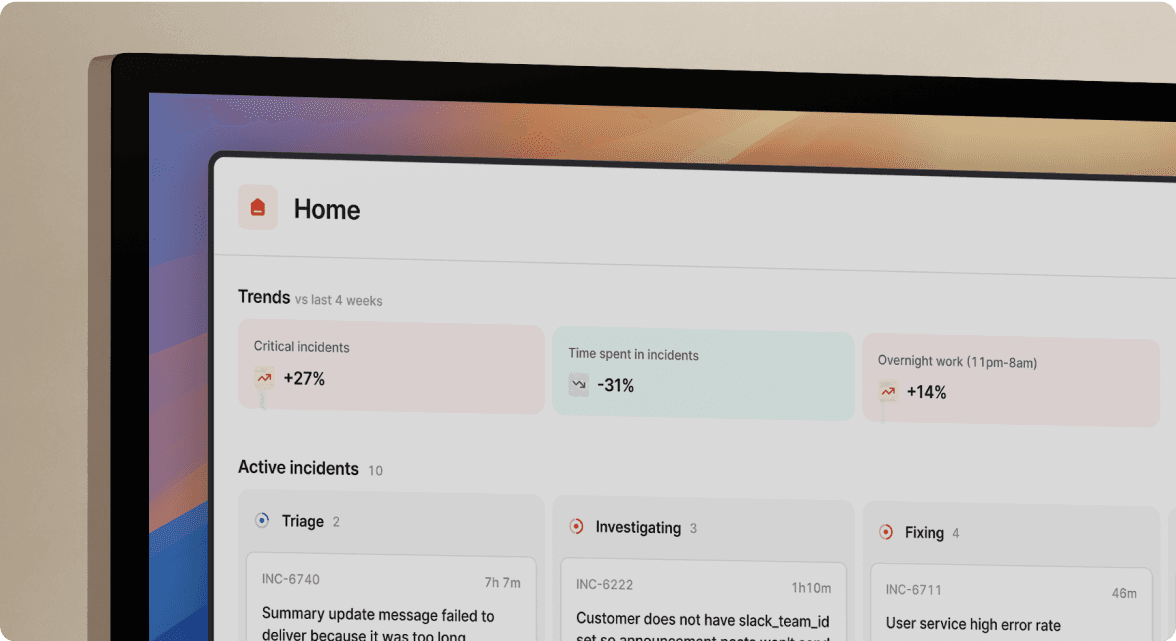
We’d love to talk to you about
- All-in-one incident management
- Our unmatched speed of deployment
- Why we’re loved by users and easily adopted
- How we work for the whole organization



